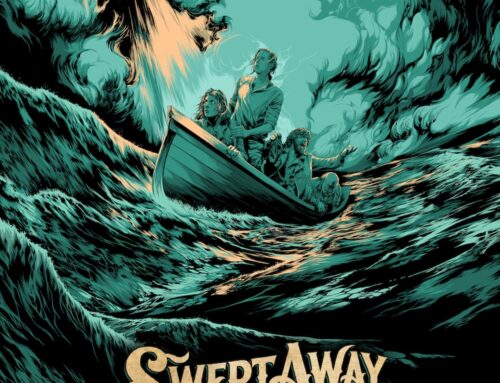 On my way home from work yesterday, I was listening to NPR, and heard an interview with Debra Lee, the CEO of BET (aka Black Entertainment Television).
On my way home from work yesterday, I was listening to NPR, and heard an interview with Debra Lee, the CEO of BET (aka Black Entertainment Television).
At one point, she was asked who she defines as her competition, and she said (I quote):
“Everyone. Anyone that’s fighting for eyeballs, whether it’s a cable network, video game, movie theater — I define my competition as any entertainment outlet that’s fighting for eyeballs.”
Image: dietadeporte via Flickr, CC 2.0
Earlier in the interview, when asked about BET’s role, she said (I quote again):
“BET’s been around for 32 years, and our role today is the same as it’s always been, is to provide a platform for African American programming and news and information for our audience. Even with the addition of all the new channels and cable and satellite and digital, there is [sic] still very few outlets that target African Americans.”
To me, these two answers seem contradictory.
If BET’s role is to provide a platform for African American programming, news and info, then isn’t its competition anyone who’s fighting for those eyeballs, as opposed to any eyeballs?
At the same time, I get the “everyone’s my competition” argument. It’s one we hear, if not overtly, then covertly, all the time.
It’s one we see all the time, from organizations, outlets, channels, brands, even blogs, that are trying to be everything to and for everyone, because they are so scared of their shrinking audience, the increasing competition, and have no idea how to cut through the clutter.
It just doesn’t sit right with me, though. To me, if everyone’s your competition, then everyone’s your audience.
And if everyone’s your audience, then no one’s your audience. I didn’t come up with that line, as you know, but I subscribe to it.
And if you don’t know who your audience is, you won’t be able to identify your competition and figure out ways to get ahead, let alone work with them (which can be an excellent strategy for building your business).
Who do I need… to do what?
When clients come to us and say, “Help me do X,” one of the first things we do – at least, I do, and I’m pretty sure my colleagues and friends who are smart marketers do the same – is ask, “OK. You want to do X. Now tell me, who are the people you need to help you do X?”
That’s paraphrasing it casually, of course. And there are many other questions I ask as well, quite a few of which are the basic questions I’d ask when trying to figure out a measurement framework, because to me, strategy and measurement go hand in hand.
But one of the most important questions we need answered – or help from the client so that we can figure out the answer together – is who the audience is, or how they prioritize their various audiences, so that we can figure out what kinds of actions we hope they will/want them to take … and then put in place what we think will be the most effective strategy and tactics to achieve the desired outcomes.
If “everyone” is your audience, how can you do this?
Yes, the Internet makes information accessible to everyone (well, everyone online, but for the purpose of this post, it’s probably ok to generalize this specific “everyone”).
But that doesn’t mean “everyone” is going to impact your brand, or your business, in the same way. That’s why people are going crazy trying to figure out who their “influencers” are and there’s so much poppycock around it.
Ms. Lee is the CEO of a huge company, and has much, much more money than I do, so she clearly knows a lot that I don’t… and I imagine she said what she did based on years of experience, market research, etc. So maybe “everyone” really is her competition.
But for the 87.213% – a completely arbitrary statistic that I just made up – of us who are not running media machines, MNCs or Fortune 50 companies, subscribing to the “everyone is my competition” would be a huge mistake, in my opinion.
“Everyone” is not interested in what you’re selling. And when “everyone” is not interested in what you’re selling, they’re not looking at “everyone” when weighing alternatives. To me, it’s as simple as that.
So instead of trying to be everything to everyone, why not just be the best, or one of the best, to the people who are going to make a difference to you?
I’ve had my say… now it’s your turn. What do you think? Can “everyone” be your audience… and competition? And if so, how do you go about winning and getting ahead of them, respectively? Or do you, like me, think we need to be more focused in how we approach our audiences? Please do share, you know the floor is now yours!









@GetIntertwined Thanks so much for sharing!
@jacksonwightman Thank you! How are you? I was thinking of you just the other day…
@shonali I am well. Working on a new side biz. How’s agency life?
@jacksonwightman What’s the side biz?
@shonali it is an online program of study. I’ll def be into you w/more deets.
@jacksonwightman Sounds awesome!
I’ve been thinking about “if everyone is your audience then nobody is your audience” comment. And while I can see that there is some truth to that I also wonder about a different approach. What if you do this:
– Define who you are. This is what your product, organization, etc., stands for.
– Then you engage with everyone who wants to engage with you.
You can still go after some of the target audiences, but I think you might be surprised who all wants to play with a brand when it’s clear what brands stand for, are transparent and make it easy to interact.
For example, let’s take the BET comment. I flipped by BET before while channel surfing and I’ve ended up on BET before. And watched something. So, in that sense, yes, the competition comment has some truth to it.
@CTrappe I wasn’t ignoring your comment, it was such a good one that it had me thinking for quite a while before I could respond to you!
Actually, what you say makes total sense. By defining who *I* am, or my company is (or brand, etc.), I’m telling people very clearly what kind of engagement I revel in… and then that’s the business I should start attracting… right?
I personally haven’t had your experience with BET, but I have had it with other channels. And certainly, that’s made me more aware of channels/willing to factor them into my viewing choices… however, that doesn’t make me their primary audience. I could potentially be a valuable secondary/tertiary audience, but unless I’m in their core demographic/psychographic (and if I were, chances are I’d be aware of them unless they were doing a crap job at programming and/or marketing), I don’t know that having my eyeballs on them would help in a meaningful way.
[…] http://www.waxingunlyrical.com – Today, 7:02 AM Rescoop […]
I heard the same program and had the same thought. I just don’t understand how “everyone” can be your audience. And, if you can convince me they are, there must be some groups that you “target” differently than others. I always probe to see who people are really talking to and try hard to avoid the everyone answer. I find those who say everyone normally don’t understand segmenting, which is why the line of questioning you address here is very helpful.
@mdbarber Exactly… and thank you for stopping by! How are you? It’s been ages…
It’s a total fallacy to say that everyone is your audience. Yes, we’re all competing for eyeballs, but we’re not competing for the SAME eyeballs. The only eyeballs that matter are the ones that belong to your target market, your ideal customer. Otherwise, you’ll just end up with a scattershot approach that won’t get you any results.
Great post, Shonali!
@lauraclick Thanks!
Great post — heard that interview too. Marketplace — American Public Radio that is broadcast on NPR. I listen to that podcast almost daily — usually on a treadmill.
One of the other things I noticed is that she vacillated several times in identifying her audience. At times saying it was a clear segment and at others times saying it’s very wide and broad. I’d be very interested to hear from marketers from her community on this interview.
@Frank_Strong I found that really interesting too. That’s what boggled my mind – how can someone at that level not know/be able to clearly identify who their audience is?
I had a comment started and deleted it; this is an observation that runs deeper than just contradictory statements, Shonali. Lots of reflection on this.
Thanks Sonali. few years ago I started a network business, at that time I thought that everyone is my audience, because to increase my business I have to go to them and try to convince them. I appreciate your point that “who the audience is”, thanks for shearing this.
When I started my business seven years ago, a very good friend said to me, “If you try to be all things to all people, you will fail.” That’s why businesses have niches and industries where they’re strong. It’s impossible to cater to everyone.
@ginidietrich Exactly! That’s one of the many things I like so much about you. You know you’re not going to be everything to everyone, and you don’t try. And you are also by far one of THE most helpful people I’ve ever come across, so thank you for that.
On a side note, when I read that post of yours from 2009, I thought to myself, “Well. There was a time when even Ms. Gini didn’t routinely get 100+ comments on each of her posts. So there’s hope yet…” ;)
@ginidietrich @shonali It’s an important…and a hard…lesson to learn, Gini. And you’re right…the ones that have figured this out do well.
Everyone is not my audience, and everyone is not my competition. In the first, I can’t be everything to everyone. I can be something to someone, though. I can be the person who helps a company that is trying to tell its story. I can be the person who pokes and prods at a company’s communications, both internally and externally. In the second, I cut myself off from opportunities when I view everyone as my competitor. I think the pie is large enough that we all can have a bite. Why not work together when possible? Yes, some people are my competitors, but they’re the people who are doing the same thing I’m doing – coaching businesses and communications professionals and helping businesses to produce better communications. I do have my own little “edge” with my emphasis on creativity and telling stories in different formats. That helps me some I think.
@Erin F. You put that beautifully so I will just say “bravo”!
@Erin F. I agree with Shonali. Well said, Erin!
Oh, so now you’ll let me comment, you have must have been afraid I would be talking about me.
Ok, what if I just talk about the place I work? We are a full lines insurance agency; we have all the licenses and markets to sell anything and to anybody. However, that is not our gig; in fact, we don’t even advertise in the yellow pages. If you are just a ‘shopper’ of insurance then you probably don’t fit our business model. We are very specific in the type of customer we want to do business with.
Can anybody with a license be our competition? I suppose so, but most of them will be happy to go after the business we don’t want and we will be happy to let them do so.
It seems to work pretty well for us; we are still the ‘big dog’ in Polk County so something must be working, huh?
@bdorman264 LOL! Thank you again for giving me the heads up yesterday; something funky happened when I upgraded Livefyre to the new version, as jasonkonopinski pointed out. I rolled it back (with Jason’s help) to the older version as soon as I could!
You and your example are exactly what I mean about smart marketing & targeting. And I’m willing to bet that is why you do well and are the “big dog” in Polk County, as you say.
<i>Ms. Lee is the CEO of a huge company, and has much, much more money than I do, so she clearly knows a lot that I don’t… and I imagine she said what she did based on years of experience, market research, etc. So maybe “everyone” really is her competition.</i>
I am a big skeptic. I am rarely convinced that money or title means someone knows more than I do. I don’t think that you necessarily do either.
Many businesses operate based upon the hard work of many and a lot of luck. Real analysis and understanding of what is significant and what isn’t seems to be something that isn’t as readily accessible as it should be.
@TheJackB Yes, I know you’re a skeptic, it’s one of the reasons I like you!
As far as money & title equating to knowledge… you’re right… but on the other hand, they did something right (or perhaps many things) to get to that money & title, no? That’s what I meant. And I certainly don’t think I know everything, or more than everyone else – but I will say that in my field, I am probably relied on more than a lot of peers for advice. As are people like @ginidietrich , mcclennan , dbreakenridge , etc. And also less than other peers… !
I agree with you that luck is always a factor, whether people realize, or acknowledge it, or not. But surely an organization as large as BET bets [sic] on more than that?
@Shonali @ginidietrich mcclennan dbreakenridge
I can’t say that success is based upon nothing but luck and maintain a straight face. There is a lot of hard work that goes into it..
It might be fair to say that my comment/feeling here is egocentric but my experience has shown me there are a lot of people who “ascend” to the highest ranks because they are good at politics and/or in the right place at the right time.
Some people are really good at accepting accolades for things their team did but they promote it as their own work.
I like to see things first hand and get a chance to determine if someone knows more than how to say the right things. I might be wrong, won’t be the first or last time.
I love this post @shonali It is really hard for business owners to figure certain things out. I had a long talk with Claudia at Chunk-n-Chip that her competition is not the other Gourmet Ice Cream Sandwich truck or even the ones in storefronts. I view every snack and dessert that is premium as her competitor. When she realized how huge that market is in LA/OC she knew the possibilities.
On the flip side my friend has me on board doing social media for her client. But she never had me have a meeting with them. I have no idea what their goals are, customers I should target, location, etc. And they are a B2B/B2C service business that most people aren’t going to want to be dealing with on social media. BUT there is potential I can carve out a special niche for them to help drive some sales as well as grow their web presence with specialized content. But I need to know so much more.
You are always timely!
@HowieSPM You hit on something that I may expand further in another post – that the competition is not always who you think it is. And actually, that was spurred when I was reading leeodden ‘s #OptimizeBook (btw, it is TERRIFIC) and chatting with Lee a few days ago, because he mentions it early on in the book. And like I said to him, it seems like such an obvious thing, but most organizations/clients don’t realize that; they have very fixed ideas and perceptions on who their competition is.
So … you are trying to do SM when you have no idea what you’re trying to achieve for a client? Welcome to the battles we fight on a daily basis, LOL!
My audience, throughout my professional career, has never been “everyone” for the simple reason that regardless of who I was representing…Army, Air Force, Honeywell, Blood Bank of Hawaii, et.al…not “everyone” could or was willing to be a part of what I was offering. It was neither feasible nor cost effective to spend time and dollars chasing them.
Defining target audiences takes time and money, too. But, when you TAKE that time and invest that money…wisely, your efforts result in more positive impact on the bottom line.
@KirkHazlett Exactly! Given how huge an organization BET is, I imagine they do their research etc… they have to, right? That’s why this set of answers struck me as incongruous, at the very least… but again, like @rachaelseda said, maybe it was just a radio moment (or a few of them).
Hm. Well, the answer for lil’ ol’ me is certainly not–I’d go crazy! But in her example and in the social context I’m familiar with, I do understand what she’s saying. African Americans have special interests as a group and appreciate those interests catered to in various aspects of society. However, we also come from extremely diverse cultural and ethnic backgrounds and are very much assimilated into the mainstream US backdrop–and fringe offshoots of mainstream pop culture–at the same time. So when she says she’s fighting for African American eyeballs, she’s saying African Americans will just as soon watch Spike, Lifetime, or Nickelodeon as BET. BET’s role as a special interest channel is complicated because of the diverse interests of her audience, and because the channel isn’t aimed at any one particular African American social group.
@ShakirahDawud We definitely don’t want you going crazy!
You give a great explanation, Shakirah – thank you! I totally get where you’re coming from, but that’s also why I think she contradicted herself, or maybe wasn’t as clear as she could have been… or *you* were, for that matter. Because when I hear “any entertainment outlet that’s fighting for eyeballs,” to me that says that could literally any outlet and any eyeballs. Including, for example, mine. And I am definitely not BET’s target audience. Neither would I choose to watch Spike or Nickolodeon, and thank goodness I got over my Lifetime jag ages ago!
I do think BET has a particular challenge, given the assimilation you mention (and, conversely, the adoption, from the mainstream point of view). Do you think it would be worth their while to try and invest in programming that would attract non-African American eyeballs? And by that I don’t mean the crap that you see most places, but really thought-provoking programming that is an eye on the many facets of the Afr-Am community? The kind of programming I, for instance, would be interested in, but which I typically find on PBS or, of all places, HBO. Or did they try this and fail?
@Shonali As you’ve highlighted, it’s a one-sided “fight,” since she’s pulling for Black eyes (although she probably wouldn’t mind yours, either), but the competition she refers to is pulling for mainstream (including Black) eyes.
I almost speculated the same thing you did about programming choices at the end, but didn’t for lack of information, lol. I have no idea on either count about your ending questions because I haven’t actually watched BET myself in many years, and it’s only been around a bit longer than I have. Since it’s supposed to be an entertainment channel, I don’t know whether they’ve ever considered adding anything a bit more cerebral (or if it’s on there now).
Perhaps this was the easy, quick and safe answer for her to give on NPR but if she actually believes that everyone is her audience and acts accordingly she has a bigger issue. Like you mentioned, she already contradicted herself in her answer and personally I could already think of a few target audiences that I would assume (if I were) I’d want to put on my priority list to influence. From there one would think you’d want to figure out what else your target audiences are consuming, hence some possible competition.
I hope she gave this answer because it was easy and safe in her mind, because to me it doesn’t make much sense if you dive even a little bit deeper.
@rachaelseda It *is* a “radio-ready” answer, isn’t it? Definitely short and snappy, and one that is less likely to get edited…? And you know what, Rach, I completely blanked on calling you last night… aargh! I will make up for it today, I promise!
I think we fall back on the “everyone” answer when we are cutting across a wide range of demographics. Clearly, McDonalds isn’t for everyone, but I’d be they do well across pretty much all demographic categories. They probably do a great business among male adults 25-34. But they won’t do well with those who are vegetarians/vegans, or those who are super fitness conscious who might fall into that demographic. So while they might cover a wide demographic, they clearly aren’t targeting “everyone”. Or if they are, they shouldn’t be.
We need to clearly define our audience, which these days might be more along psychographics than traditional demographics. But, we’re so conditioned to talk about demographics, we forget the subtleties that separate people. It’s not just about age, gender, location, income…but more about our passions, interests, and lifestyle.
@KenMueller That’s exactly what I meant when I said that there are those that are not part of the 85.764% or whatever statistic I made up… those are the McDonalds of the world, for whom “everyone’ is a fairly reasonable answer. For everyone else, though – and that includes you and me and most small businesses (even the *large* small businesses), it’s not “everyone” by a long shot.
Are psychographics still in style? I think that became pretty evenly adopted a while back, but for some reason I thought there was a shiny new term folks were using these days… but of course, if there is one, I can’t remember it, LOL!
@Shonali When we talk about passions, interests and lifestyle, we’re absolutely talking about psychographics, so, yes. :)
Now, to the point, media companies are at some level competing with independent content producers (YouTube, WebTv, podcasters, prominent bloggers, etc), so the scope of who they view as competing for audience eyeballs and attention is necessarily widening. However, what is ignored in that scenario is the role that niche interests and offerings play in getting someone to tune in or subscribe to a given media stream. The relative ease of publishing now puts my podcast content beside that of major broadcast streams via syndication platforms like Roku, LibSyn, iTunes and so on. The challenge for me is understanding intimately who will be likely to consume my content and shape my content to that niche category.